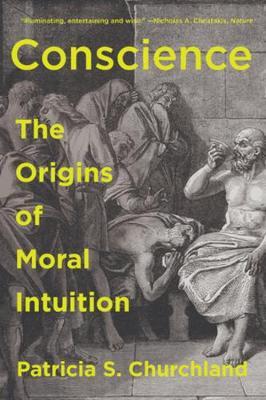Conscience: The Origins of Moral Intuition

Conscience: The Origins of Moral Intuition
Conscience, a finalist for the PEN / E. O. Wilson Literary Science Writing Award, explores why all social groups have moral systems and how these systems are formed. Distinguished professor Patricia S. Churchland brings together an understanding of the influences of neuroscience, genetics, and physical environment to elucidate how our brains are configured to form bonds and care for children, while also investigating why amoral psychopaths can arise. Churchland then turns to philosophy to understand how morality is transmitted through generations, and why it has become a foundation of all societies. Conscience joins ideas rarely put into dialogue and brings light to a subject that speaks to the meaning of being human.
Conscience, a finalist for the PEN / E. O. Wilson Literary Science Writing Award, explores why all social groups have moral systems and how these systems are formed. Distinguished professor Patricia S. Churchland brings together an understanding of the influences of neuroscience, genetics, and physical environment to elucidate how our brains are configured to form bonds and care for children, while also investigating why amoral psychopaths can arise. Churchland then turns to philosophy to understand how morality is transmitted through generations, and why it has become a foundation of all societies. Conscience joins ideas rarely put into dialogue and brings light to a subject that speaks to the meaning of being human.
Conscience, a finalist for the PEN / E. O. Wilson Literary Science Writing Award, explores why all social groups have moral systems and how these systems are formed. Distinguished professor Patricia S. Churchland brings together an understanding of the influences of neuroscience, genetics, and physical environment to elucidate how our brains are configured to form bonds and care for children, while also investigating why amoral psychopaths can arise. Churchland then turns to philosophy to understand how morality is transmitted through generations, and why it has become a foundation of all societies. Conscience joins ideas rarely put into dialogue and brings light to a subject that speaks to the meaning of being human.
Conscience, a finalist for the PEN / E. O. Wilson Literary Science Writing Award, explores why all social groups have moral systems and how these systems are formed. Distinguished professor Patricia S. Churchland brings together an understanding of the influences of neuroscience, genetics, and physi
PRP: 117.52 Lei
Acesta este Prețul Recomandat de Producător. Prețul de vânzare al produsului este afișat mai jos.
105.77Lei
105.77Lei
117.52 LeiLivrare in 2-4 saptamani
Descrierea produsului
Conscience, a finalist for the PEN / E. O. Wilson Literary Science Writing Award, explores why all social groups have moral systems and how these systems are formed. Distinguished professor Patricia S. Churchland brings together an understanding of the influences of neuroscience, genetics, and physical environment to elucidate how our brains are configured to form bonds and care for children, while also investigating why amoral psychopaths can arise. Churchland then turns to philosophy to understand how morality is transmitted through generations, and why it has become a foundation of all societies. Conscience joins ideas rarely put into dialogue and brings light to a subject that speaks to the meaning of being human.
Conscience, a finalist for the PEN / E. O. Wilson Literary Science Writing Award, explores why all social groups have moral systems and how these systems are formed. Distinguished professor Patricia S. Churchland brings together an understanding of the influences of neuroscience, genetics, and physical environment to elucidate how our brains are configured to form bonds and care for children, while also investigating why amoral psychopaths can arise. Churchland then turns to philosophy to understand how morality is transmitted through generations, and why it has become a foundation of all societies. Conscience joins ideas rarely put into dialogue and brings light to a subject that speaks to the meaning of being human.
Conscience, a finalist for the PEN / E. O. Wilson Literary Science Writing Award, explores why all social groups have moral systems and how these systems are formed. Distinguished professor Patricia S. Churchland brings together an understanding of the influences of neuroscience, genetics, and physical environment to elucidate how our brains are configured to form bonds and care for children, while also investigating why amoral psychopaths can arise. Churchland then turns to philosophy to understand how morality is transmitted through generations, and why it has become a foundation of all societies. Conscience joins ideas rarely put into dialogue and brings light to a subject that speaks to the meaning of being human.
Conscience, a finalist for the PEN / E. O. Wilson Literary Science Writing Award, explores why all social groups have moral systems and how these systems are formed. Distinguished professor Patricia S. Churchland brings together an understanding of the influences of neuroscience, genetics, and physi
Detaliile produsului











